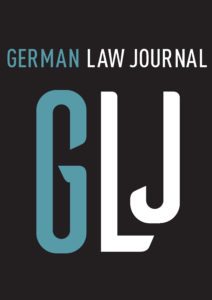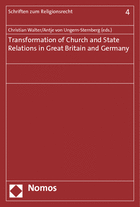Oct 30, 2019
Données bibliographiques / Bibliografische Daten |
|---|
| Auteurs / Autoren: | WALDHOFF, CHRISTIAN; WITTMER, FABIUS |
|---|
| Source / Fundstelle: | https://www.cambridge.org/core/journals/german-law-journal/article/religious-education-in-germany-in-light-of-religious-diversity-constitutional-requirements-for-religious-education/DA53CF0E68B465C7FD4E027BAD3887AF# |
|---|
| Revue / Zeitschrift: | German Law Journal |
|---|
| Année / Jahr: | 2019 |
|---|
| Localisation / Standort: | German Law Journal, Volume 20, Issue 7, pp. 1047-1065 |
|---|
| Catégorie / Kategorie: | Droit de la religion, Religionsrecht |
|---|
| Mots clef / Schlagworte: | Religionsrecht, Religionsverfassungsrecht, Éducation religieuse, Enseignement de la religion |
|---|
 Abstract:
Abstract:
In Article 7, paragraph 3, the German Constitution provides that religious education shall be a part of the curriculum of public school. This is one of the three approaches of dealing with religious education existing today. Originally, religious education as a regular subject at public schools in Germany was only offered by the two Christian Churches—Catholic and Protestant. As the number of Christians decreased and the number of Muslims increased, the demand for Islamic religious education at public schools grew. Therefore, the question arose whether the constitutional law concerning religion is capable of facing the new challenges of religious diversity. This article tries to answer this question with regard to the introduction of Islamic religious education as a measure of adaptiveness. In the first step, the requirements of Article 7, paragraph 3 of the Constitution posed to religious education will be outlined in order to be able to examine in the second step whether Islamic religious education may be introduced at public schools as a regular subject. In this regard, the issue of the qualification of an umbrella association as a religious society and the constitutionality of the advisory board model will be discussed.
Oct 30, 2019
 Abstract by German Law Journal
Abstract by German Law Journal :
The law on state-church relations is no longer exclusively a national concern of the EU Member States. Despite supposedly strict neutrality clauses in the primary law of the EU and rigid statements—
inter alia—by the German Federal Constitutional Court, it is safe to assume the formation of a supranational EU law on religion, which also touches upon the status of the churches and religious associations. This becomes obvious when state-church relations in Europe are reconstructed as a double conflict of laws that comprises interlocked conflicts between ecclesiastical law and worldly law, as well as between EU law and national law. Within the triangular relationship of these different legal spheres, EU law steers state-church relations towards the non-discrimination principle. The controversy in German law on religion between the proponents of a collective, institutionalist understanding (classic “Staatskirchenrecht”) and advocates of a rather fundamental rights-centered, individualist reading of the Constitution (“Religionsverfassungsrecht”) hence needs to be reconsidered. EU law calls for including yet a third paradigm into the debate: Equality.
Jan 13, 2014
Données bibliographiques / Bibliografische Daten |
|---|
| Auteurs / Autoren: | CHRISTIAN WALTER; ANTJE VON UNGERN-STERNBERG |
|---|
| Année / Jahr: | 2013 |
|---|
| Type / Typ: | |
|---|
| Catégorie / Kategorie: | Droit administratif, Droit de la religion, Kirchenrecht, Philosophie du droit, Rechtsvergleichung, Religionsrecht, Verfassungsrecht, Verwaltungsrecht, Verwaltungswissenschaften |
|---|
| Mots clef / Schlagworte: | Beziehungen zwischen Staat und Kirche, Kirchenrechte, Religion, Religionsrecht, RELIGION |
|---|

Edited by Prof. Dr. Christian Walter and AR a.Z. Dr. Antje von Ungern-Sternberg, M.A.
How do traditional church and state relations, developed within Christian legal orders, respond to Muslim immigration and religious diversification? This question is treated from a comparative perspective, focusing on Great Britain and Germany, in the contributions of this collection. After looking at the history of establishment and disestablishment in Great Britain and Scandinavia, the contributions cover specific aspects such as the individual’s legal protection in religious courts, employment disputes, church autonomy, the role of religious communities in public life and the legal status of Muslim communities in particular. Some of the contributions also show how the relationship is influenced by the European Convention on Human Rights. The volume is the result of a research project by the editors forming part of the Cluster of Excellency “Religion and Politics” of the University of Münster, Germany.
Nomos Verlag 2013, Schriften zum Religionsrecht, Vol. 4.

 Abstract:
In Article 7, paragraph 3, the German Constitution provides that religious education shall be a part of the curriculum of public school. This is one of the three approaches of dealing with religious education existing today. Originally, religious education as a regular subject at public schools in Germany was only offered by the two Christian Churches—Catholic and Protestant. As the number of Christians decreased and the number of Muslims increased, the demand for Islamic religious education at public schools grew. Therefore, the question arose whether the constitutional law concerning religion is capable of facing the new challenges of religious diversity. This article tries to answer this question with regard to the introduction of Islamic religious education as a measure of adaptiveness. In the first step, the requirements of Article 7, paragraph 3 of the Constitution posed to religious education will be outlined in order to be able to examine in the second step whether Islamic religious education may be introduced at public schools as a regular subject. In this regard, the issue of the qualification of an umbrella association as a religious society and the constitutionality of the advisory board model will be discussed.
Abstract:
In Article 7, paragraph 3, the German Constitution provides that religious education shall be a part of the curriculum of public school. This is one of the three approaches of dealing with religious education existing today. Originally, religious education as a regular subject at public schools in Germany was only offered by the two Christian Churches—Catholic and Protestant. As the number of Christians decreased and the number of Muslims increased, the demand for Islamic religious education at public schools grew. Therefore, the question arose whether the constitutional law concerning religion is capable of facing the new challenges of religious diversity. This article tries to answer this question with regard to the introduction of Islamic religious education as a measure of adaptiveness. In the first step, the requirements of Article 7, paragraph 3 of the Constitution posed to religious education will be outlined in order to be able to examine in the second step whether Islamic religious education may be introduced at public schools as a regular subject. In this regard, the issue of the qualification of an umbrella association as a religious society and the constitutionality of the advisory board model will be discussed.

